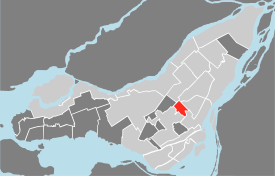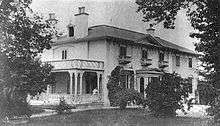Outremont, Quebec
| Outremont | ||
|---|---|---|
| Borough of Montreal | ||
|
Rue Bernard in Outremont. | ||
| ||
 Location of Outremont on the Island of Montreal. (Grey areas indicate City of Montreal). | ||
| Country |
| |
| Province |
| |
| Region | Montreal (06) | |
| Created | January 1, 2002 | |
| Electoral Districts Federal |
Outremont | |
| Provincial | Outremont | |
| Government[1][2][3] | ||
| • Type | Borough | |
| • Mayor | Marie Cinq-Mars | |
| • Federal MP(s) | Thomas Mulcair (NDP) | |
| • Quebec MNA(s) | Hélène David (PLQ) | |
| Area[4] | ||
| • Land | 3.86 km2 (1.49 sq mi) | |
| Population (2011)[4][5] | ||
| • Total | 24,846 | |
| • Density | 6,105.2/km2 (15,812/sq mi) | |
| • Change (2006-11) |
| |
| • Dwellings (2006) | 10,358 | |
| Time zone | EST (UTC-5) | |
| • Summer (DST) | EDT (UTC-4) | |
| Area code(s) | 514/438 | |
| Website | outremont.ville.montreal.qc.ca | |
Outremont is a residential borough (arrondissement) of the city of Montreal, Quebec, Canada. It consists entirely of the former city on the Island of Montreal in southwestern Quebec. The neighbourhood is inhabited largely by Francophones, and is home to a Hasidic Jewish community.
Geography
A separate city until the 2000 municipal mergers, Outremont is located north of downtown, on the north-western side of Mount Royal – its name means "beyond the mountain" although it encompasses Murray Hill (colline d'Outremont), one of the three peaks that make up Mount Royal. It was named for the house – Outre-Mont – built c. 1830 for Louis-Tancrède Bouthillier, a former Sheriff of Montreal.
The borough is bounded to the northwest by Mount Royal, to the northeast by Villeray–Saint-Michel–Parc-Extension and Rosemont–La Petite-Patrie, to the east by Le Plateau-Mont-Royal and the Mile End district, to the south by Ville-Marie, and to the west by Côte-des-Neiges–Notre-Dame-de-Grâce. The Mount Royal Cemetery is located in the south eastern tip of the borough.
It has a population of 24,846 and its area of 3.86 km2 (1.49 sq mi) makes it the smallest of Montreal's boroughs.
History

The area was originally known as Côte Sainte-Catherine. It came to be named Outremont after the country residence built by Louis-Tancrède Bouthillier in 1833 that he named Outre-Mont. In 1875, the new Village of Outremont was named after the house, which still exists today on Rue McDougall.
In 1927, Outremont became the first place in the world to use a snow blower to clear its streets in the winter. It was the first production model of Canadian inventor Arthur Sicard's Sicard Industries.[6]
Canadian Prime Minister Pierre Elliott Trudeau was born and raised in Outremont.
Features
Outremont is served by the Outremont and Édouard-Montpetit stations on the Blue Line of the Montreal Metro. (Édouard-Montpetit station is actually located in Côte-des-Neiges, but right on the Outremont border.)
Major thoroughfares include Avenue Van Horne and chemin de la Côte-Sainte-Catherine, with avenue Bernard and avenue Laurier as the principal shopping and dining areas. The area has a number of trendy restaurants, cafés and shops. Residents include a substantial percentage of expatriates from France. There is also a sizable Hassidic Jewish community, representing about 20% of Outremont's population, which resides mainly in the eastern and northern portions of the borough.[7] Many Jewish synagogues, schools and businesses can be found on avenues Van Horne, Bernard and St-Viateur.
Among the attractions in the mainly residential community are the Mount Royal Cemetery, the Salle Claude-Champagne, the Théâtre Outremont, the Saint-Grégoire-l'Illuminateur Armenian Cathedral and part of the Université de Montréal campus.
Outremont also has a rail yard along its northern border. The rail yard has been purchased by the Université de Montréal and is to be developed to house its hospital complex, its research faculties and the faculty of Health Sciences (Centre Hospitalier de l'Université de Montréal).
Outremont was twinned as a sister city with Oakwood, Ohio and Le Vésinet, France.
Demographics
| Historical populations | ||
|---|---|---|
| Year | Pop. | ±% |
| 1966 | 30,881 | — |
| 1971 | 28,550 | −7.5% |
| 1976 | 27,089 | −5.1% |
| 1981 | 24,338 | −10.2% |
| 1986 | 23,080 | −5.2% |
| 1991 | 22,935 | −0.6% |
| 1996 | 22,571 | −1.6% |
| 2001 | 22,933 | +1.6% |
| 2006 | 22,897 | −0.2% |
| 2011 | 23,566 | +2.9% |
| [8] | ||
Home language (2011) [9]
| Language | Population | Percentage (%) |
|---|---|---|
| French | 14,835 | 66% |
| English | 3,855 | 17% |
| Other languages | 3,905 | 17% |
Politics
Federal and provincial elections
The borough is entirely contained within the federal riding of Outremont and the provincial electoral district of the same name. In 2012, the riding voted NDP, re-electing MP Thomas Mulcair. In 2014, Hélène David, running for the Liberal Party, was elected in Outremont at the National Assembly.[10]
Borough council
The borough is represented on Montreal City Council by its borough mayor alone. The borough is further divided into four districts, each of which elects one borough councillor.
As of March 22, 2015,[11][12] the current borough council consists of the following councillors:
| District | Position | Name | Party | |
|---|---|---|---|---|
| — | Borough mayor Montreal city councillor |
Marie Cinq-Mars | Équipe conservons Outremont | |
| Claude-Ryan | Borough councillor | Mindy Pollak | Projet Montréal | |
| Jeanne-Sauvé | Borough councillor | Jacqueline Gremaud | Independent | |
| Joseph-Beaubien | Borough councillor | Céline Forget | Independent | |
| Robert-Bourassa | Borough councillor | Marie Potvin | Équipe Coderre |
Education
The Commission scolaire Marguerite-Bourgeoys operates Francophone public schools.[13]
Adult schools include:
- Centre d’éducation des adultes Outremont
Specialized schools include:
- Secondaire Adapté à ta Situation SAS[14]
Secondary schools include:
- École secondaire Paul-Gérin-Lajoie-d'Outremont
- Pensionnat du Saint-Nom-de-Marie
Primary schools include:
- Guy-Drummond
- Lajoie
- Nouvelle-Querbes
- Saint-Germain-d'Outremont
The Lester B. Pearson School Board (LBPSB) operates Anglophone public schools.
Public libraries
The Montreal Public Libraries Network operates the Robert-Bourassa Branch in Outremont.[15]
References
- ↑ Ministère des Affaires Municipales et Régions: Outremont (Montreal)
- ↑ Parliament of Canada Federal Riding History: OUTREMONT (Quebec)
- ↑ Chief Electoral Officer of Québec - 40th General Election Riding Results: OUTREMONT
- 1 2 2006 Statistics Canada Community Profile: Outremont, Quebec
- ↑ "Population totale en 2006 et en 2011 - Variation — Densité" (PDF). Canada 2011 Census (in French). Ville de Montréal. 2012. Retrieved 5 June 2012.
- ↑ About Sicard
- ↑ Statistics Canada 2001 Community Profile
- ↑ "Profil sociodéographique: Arrondissement d'Outremont" (PDF) (in French). Ville de Montréal. 2013. Retrieved 28 October 2013.
- ↑ http://ville.montreal.qc.ca/portal/page?_pageid=6897,68087661&_dad=portal&_schema=PORTAL
- ↑ "Résultats des élections Québec 2014 | Actualités internationales - nationales - régionales - Montréal - Québec - Canada | LaPresse.ca". La Presse (in French). Retrieved 2015-10-20.
- ↑ Hacker-B., Daphnée (May 6, 2014). "La mairesse d’Outremont perd ses deux conseillères". Métro. Retrieved May 7, 2014.
- ↑ "L'Équipe Coderre remporte la partielle d'Outremont". Canoe.ca. March 22, 2015. Retrieved March 22, 2015.
- ↑ "ÉCOLES ET CENTRES." Commission Scolaire Marguerite-Bourgeoys. Retrieved on December 7, 2014.
- ↑ http://www3.csmb.qc.ca/ecoles/Default.aspx?alias=www3.csmb.qc.ca/ecoles/sas
- ↑ "Les bibliothèques par arrondissement." Montreal Public Libraries Network. Retrieved on December 7, 2014.
External links
| Wikivoyage has a travel guide for Montreal/Outremont. |
See also
Coordinates: 45°31′N 73°37′W / 45.517°N 73.617°W


